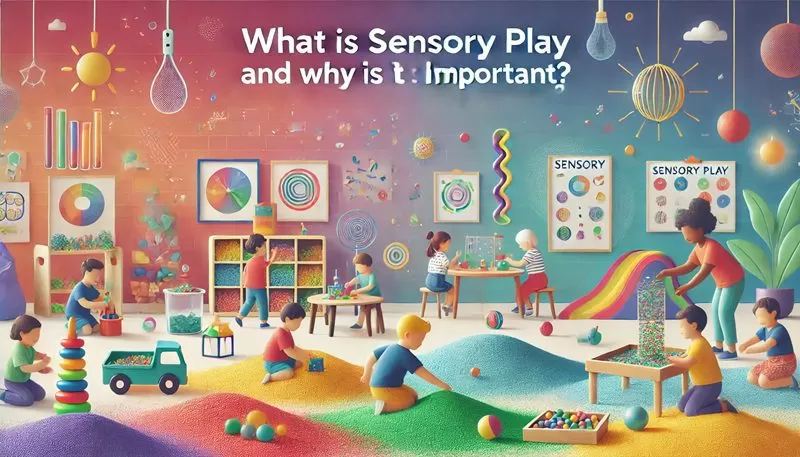Table of Contents
Sensory Play Importance Explained
Sensory play is a fundamental part of childhood development, engaging a child’s senses—sight, touch, taste, sound, and smell—while promoting exploration and learning in a fun, interactive way. It is a form of play that stimulates the brain, builds fine motor skills, and encourages cognitive growth. For parents, understanding the importance of sensory play for babies can transform how you foster your child’s development at an early age. In this article, we’ll explore the key benefits of sensory play and why it’s so essential for children’s overall growth, while introducing a few of our store’s must-have sensory toys designed to enhance these developmental milestones.
Research shows that sensory play is a vital part of early childhood development, as it stimulates a child’s senses and promotes brain growth, fine motor skills, and problem-solving abilities. For a deeper understanding of how sensory play impacts child development, explore this comprehensive guide on the importance of sensory play in early childhood, published by Zero to Three, a renowned organization dedicated to ensuring all babies and toddlers have a strong start in life.
As parents dive into the world of sensory play, they often encounter various challenges, including the effects of sleep deprivation. How to Deal With Sleep Deprivation After Baby offers valuable insights on managing the fatigue that can come with caring for a newborn. Understanding how sensory play can positively impact your baby’s development is crucial, but it’s equally important to take care of yourself. By implementing strategies to combat sleep deprivation, you can enhance your ability to engage in meaningful sensory activities with your little one, ultimately benefiting both you and your child.
What is Sensory Play?
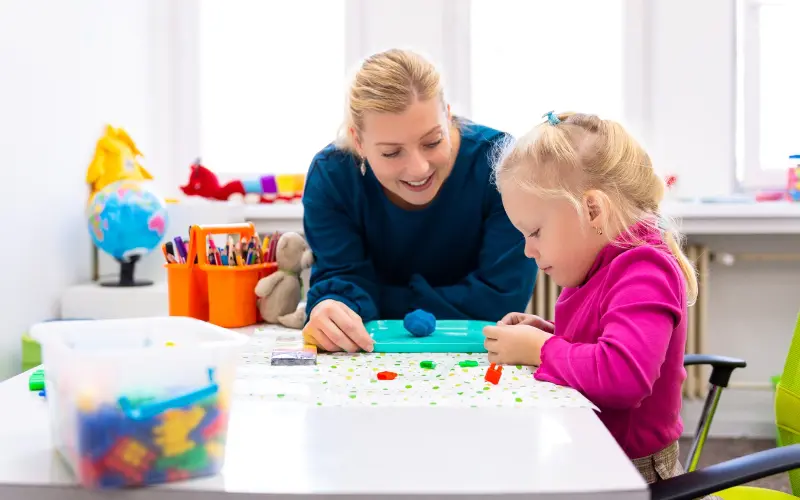
Sensory play refers to any activity that engages your child’s senses in a hands-on, interactive way. Whether it’s through sight, sound, taste, touch, or smell, these sensory experiences are vital for young children’s brain development. Activities such as playing with water, exploring different textures, or even using musical toys all fall under the category of sensory play. These types of experiences encourage children to explore their surroundings, build curiosity, and develop problem-solving skills.
Sensory play not only introduces babies to new sensations but also aids them in understanding the world around them. For example, when babies feel different textures or hear various sounds, they begin to build neural pathways that help with learning and memory retention. Our Textured Sensory Balls are a perfect example of toys that introduce a variety of tactile experiences to babies and toddlers. These balls come in different shapes, sizes, and textures, helping stimulate touch while also improving hand-eye coordination.
When engaging in sensory play, it’s important to consider the potential for mess, especially for little ones who are still mastering their diaper skills. Understanding how to effectively manage diaper blowouts and leaks can help parents maintain a stress-free and enjoyable sensory experience. For practical tips on keeping things tidy while your child explores the world through their senses, check out our article on Managing Diaper Blowouts and Leaks.
The Importance of Sensory Play for Babies
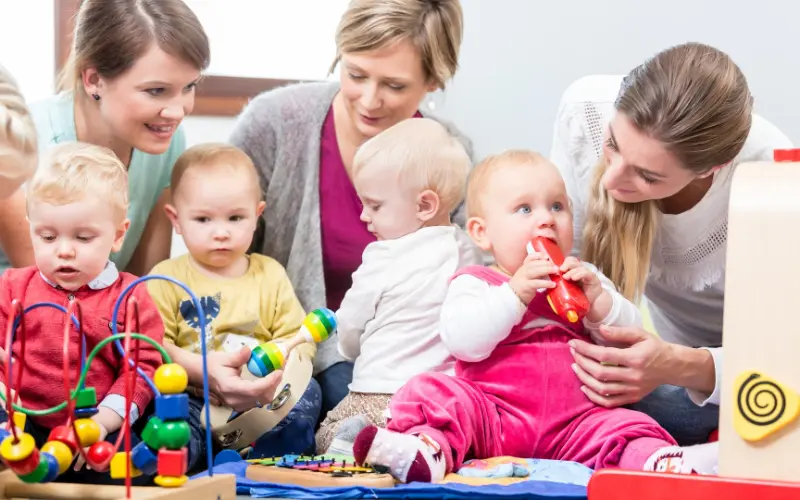
Sensory play is more than just a source of entertainment; it’s a crucial part of your baby’s education. Babies learn about their environment primarily through their senses, and sensory activities offer a safe and structured way for them to explore, experiment, and practice essential developmental skills. By incorporating sensory play into your baby’s routine, you’re providing them with opportunities to grow and develop key cognitive and physical abilities.
For instance, introducing sensory toys like our Musical Play Mat does more than just entertain your baby. It encourages them to explore sounds, movements, and colors, all of which are essential sensory experiences that support brain development. The act of kicking, touching, and hearing sounds when they interact with the mat helps your baby establish connections in the brain that are crucial for future learning.
Babies who engage in sensory play early on tend to develop better motor skills, enhanced memory, and heightened concentration. The tactile, visual, and auditory stimulation these activities provide helps create neural pathways in the brain that are critical for learning. As a parent, offering diverse sensory experiences can play a significant role in your baby’s ability to explore their world confidently.
How Sensory Play Supports Cognitive Development
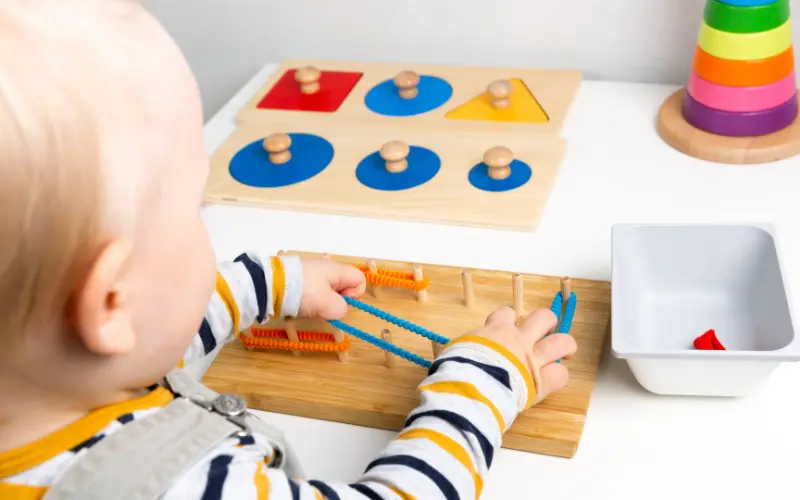
Research consistently highlights the importance of sensory play in fostering early childhood development. According to child development experts, sensory play lays the foundation for more complex cognitive tasks like reading, writing, and solving puzzles. By engaging multiple senses at once, sensory play helps build neural connections that lead to better problem-solving abilities and cognitive growth.
The benefits of sensory play extend well beyond simple amusement. For example, our Interactive Sensory Table offers a variety of textures, shapes, and materials that promote cognitive exploration. As babies manipulate these different objects, they begin to understand cause and effect, spatial awareness, and develop a deeper understanding of the physical properties of objects. This type of play also encourages independent thinking and critical problem-solving, both of which are essential skills as they grow.
Social and Emotional Development through Sensory Play
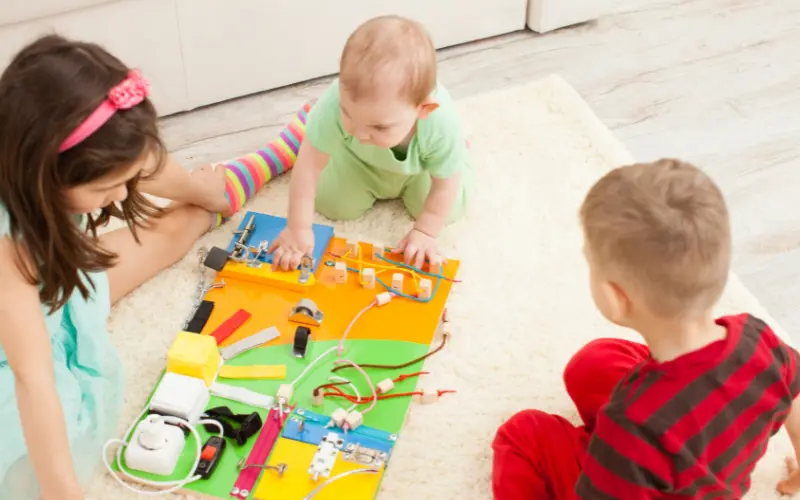
In addition to its cognitive benefits, sensory play can significantly impact your child’s social and emotional development. Engaging in group sensory activities often involves cooperation, sharing, and teamwork. This helps babies and toddlers learn important social cues, such as empathy, patience, and communication. Activities like water play or sandbox play can teach your child how to navigate social interactions while simultaneously providing a fun and creative outlet for self-expression.
For example, toys like our Water Play Table are perfect for encouraging interactive play. Whether your child is playing alone or with friends, the water playtable stimulates curiosity while also fostering a sense of collaboration. This is especially beneficial for babies who are learning to share or play cooperatively with others, helping to build their social skills early on.
The Benefits of Sensory Play for Babies
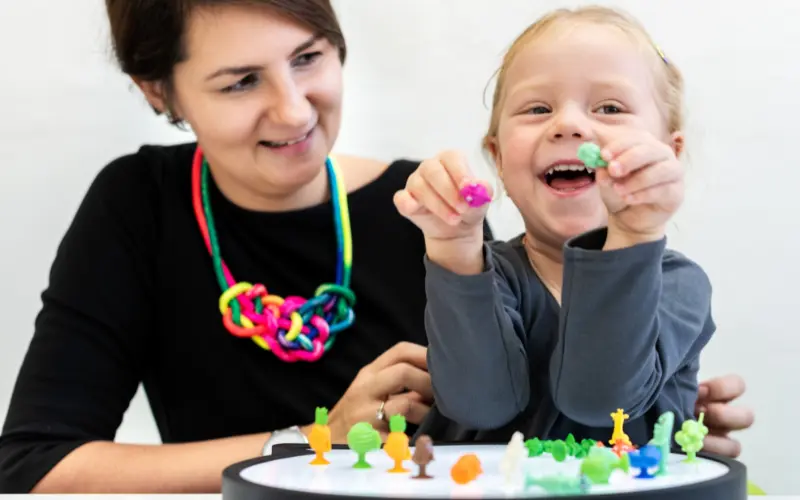
The advantages of sensory play extend far beyond immediate enjoyment. Sensory activities help build cognitive skills, encourage social interaction, and even have therapeutic benefits for children who may be dealing with sensory processing issues. Whether your baby is stacking textured blocks, playing with water, or exploring new sounds, each activity contributes to their physical, mental, and emotional growth.
Improved Motor Skills
By encouraging babies to manipulate objects, grip different textures, and explore movements, sensory play promotes the development of fine motor skills. Simple activities like squeezing, stacking, and pulling objects not only improve coordination but also strengthen muscles in the hands and arms. Our Sensory Play Cube offers a variety of tactile features designed to keep little hands busy while also helping build dexterity and hand-eye coordination.
Cognitive Growth
Sensory play encourages problem-solving and critical thinking. As children explore and interact with different materials, they begin to understand patterns, cause and effect, and spatial relationships. Playing with sensory toys helps babies practice these essential cognitive skills in a fun and engaging way. With toys like our Musical Play Mat, babies can practice pressing different buttons to trigger sounds and lights, learning about cause and effect as they play.
Language Development
Sensory play is a powerful tool for language development. As children explore objects and materials, they often try to describe them—whether through gestures, babbling, or early words. This practice encourages verbal communication and helps build their vocabulary. When parents engage with their children during sensory play, asking questions like “What does this feel like?” or “What sound does this make?” it encourages babies to respond, enhancing their language skills.
Social Interaction
Sensory play often involves group activities where children can learn from one another, promoting skills like sharing, cooperation, and empathy. Group sensory activities allow children to observe how others approach different textures or sounds, which can inspire new ways of thinking and playing. Toys like our Water Play Table are excellent for fostering interactive play, encouraging babies to explore, share, and collaborate with peers.
When engaging in sensory play, it’s essential to create an environment that allows for exploration and discovery. This is especially important for families who enjoy traveling with their little ones. Incorporating sensory activities can be a fantastic way to keep babies entertained during long journeys. If you’re planning a trip, be sure to check out our guide on How to travel with a baby, and the gear you need. This article provides valuable insights on selecting the right equipment, from strollers to travel cribs, ensuring that your sensory play activities can continue seamlessly, no matter where you go.
Incorporating Sensory Play at Home

Integrating sensory play into your baby’s daily routine doesn’t have to be complicated. Many simple household items can be used to create engaging sensory experiences for your baby. Below are some easy ways to introduce sensory play at home:
- Water Play: Fill a small tub with water and let your baby splash, play with waterproof toys, or use measuring cups to pour water from one container to another.
- Sensory Bins: Create a sensory bin with rice, beans, or sand, allowing your baby to explore different textures.
- Musical Play: Play with musical instruments like maracas, tambourines, or our Musical Play Mat to stimulate your baby’s auditory senses.
For those looking for more structured activities, sensory-specific toys like our Textured Sensory Balls and Interactive Sensory Table can provide endless entertainment while nurturing developmental milestones. These toys are designed to engage multiple senses simultaneously, promoting cognitive, social, and physical growth in a fun and interactive way.
When exploring sensory play, it’s essential to consider the broader context of newborn health. One common condition that can affect a baby’s sensory experiences is jaundice. Understanding jaundice in newborns—including its symptoms, causes, and treatment—is crucial for parents. Jaundice can impact a baby’s alertness and responsiveness, which are vital for engaging in sensory activities. For more information on this important topic, check out our article on Jaundice in Newborns – Symptoms, Causes, and Treatment.
Recap: The Importance of Sensory Play for Babies
In conclusion, sensory play is essential for a child’s early development, helping to improve fine motor skills, cognitive abilities, and social interaction. Understanding the benefits of sensory play for your child will allow you to create enriching experiences that foster growth and learning. Whether you’re using simple household items or investing in sensory-specific toys like our Interactive Sensory Table, the opportunities for learning are limitless.
By introducing sensory activities early on, you’re not only encouraging your child to engage with their environment but also laying the foundation for lifelong learning. Sensory play is a powerful tool that supports every aspect of a child’s development, from motor skills to language acquisition. For more sensory toys and playtime solutions, be sure to explore our range of products designed to support the importance of sensory play for babies.

